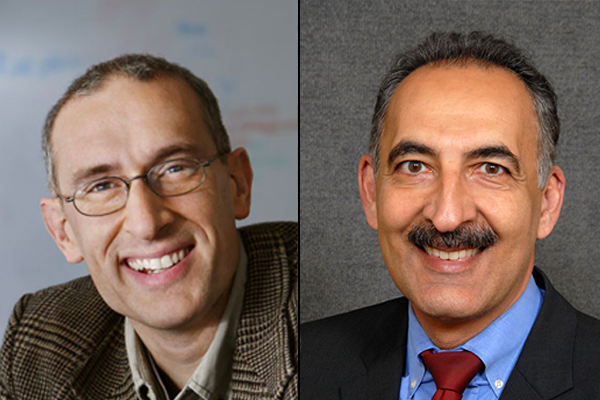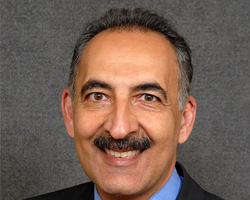Election as an NAI Fellow is the highest professional distinction accorded solely to academic inventors. Fellows are chosen because they “have demonstrated a highly prolific spirit of innovation in creating or facilitating outstanding inventions that have made a tangible impact on the quality of life, economic development and welfare of society.”
Genin and Guilak join 16 other Washington University faculty members who have been named fellows since the program began in 2012.
Collectively, NAI Fellows hold more than 58,000 issued U.S. patents, which have generated more than 13,000 licensed technologies. The 2022 fellow class will be officially inducted at the National Academy of Inventors meeting in June in Washington, D.C.
Guy Genin
Genin, an internationally renowned expert in mechanobiology, studies interfaces and adhesion in nature, physiology and engineering. His research aims to make lasting impact on medicine and health by understanding and harnessing the science of how force affects living systems.
Genin’s research has uncovered the mechanobiology of how cells respond to contact stresses and adapt to and remember these interactions, and he has developed technologies that impact patient care in the St. Louis region and throughout the world.
Genin’s research has led to numerous patents and St. Louis-based startup companies that have improved public health. Among them is Caeli Vascular Inc., which offers new treatments for deep vein thrombosis (DVT) and pulmonary embolism. The invention at the core of Caeli Vascular enables the safe surgical removal of DVTs. Another startup, Inflexion Vascular LLC, offers neurovascular surgery catheters that have been optimized using mechanobiological motifs found in creeping plants.
Genin co-founded and co-directs the National Science Foundation Science and Technology Center (STC) for Engineering MechanoBiology at WashU, one of 14 such centers in the U.S. and the first in Missouri. This STC brings together an interdisciplinary cohort, across WashU and other universities. Through the STC, Genin encourages interdisciplinary innovation in mechanobiology that bridges plant and animal biology with the biological and engineering sciences.
Genin, who is also a professor of neurological surgery and lead mechanical engineer in the Division of Neurotechnology at the School of Medicine, has received numerous international awards for engineering design, teaching and research, including the Yangtze River Scholar Award, the highest award given to a researcher by China’s Ministry of Education; a Research Career Award from the National Institutes of Health (NIH); the Skalak Award from the American Society of Mechanical Engineers (ASME); and local awards, including the Eads Medal from the St. Louis Academy of Science.
Genin is a fellow of ASME and of the American Institute for Medical and Biological Engineering.
Genin joined the university in 1999. He earned bachelor’s and master’s degrees from Case Western Reserve University and master’s and doctoral degrees in applied mechanics and solid mechanics from Harvard University. He completed postdoctoral training at Cambridge and Brown universities.
Farshid Guilak
Guilak, co-director of the Washington University Center for Regenerative Medicine, also was elected a member of the National Academy of Engineering and the National Academy of Medicine this year.
Guilak was honored for his pioneering work in developing a new type of replacement joint. His team has developed techniques to grow cartilage from patients’ donor cells to create living joint replacements for those with arthritis in the hip. The researchers do extensive imaging to learn the exact shape and contours of the hip. They take skin cells or fat cells from the patient, treat the cells to make them into pluripotent stem cells and then treat the stem cells with factors that cause them to grow into cartilage cells.
Next, using what they’ve learned from imaging, they build a scaffold out of material similar to what is used in sutures so that it exactly conforms to an individual hip joint. Then they coat the scaffold with the cartilage made from the patient’s own donor cells. Because the cartilage is made from the cells taken from the patient, it is believed there will not be a need for extensive immunosuppression when the cartilage-coated scaffold is implanted. CytexOrtho, a startup company Guilak helped form, is planning clinical trials of the technique.
His laboratory also has pioneered the use of CRISPR-Cas9 technology to engineer SMART cells (Stem cells Modified for Autonomous Regenerative Therapy) with synthetic gene circuits that can secrete biologic drugs in response to factors such as inflammation or stresses caused by mechanical loading related to arthritis.
Guilak also is a professor of developmental biology and of biomedical engineering and mechanical engineering and materials science at the McKelvey School of Engineering. In addition, he is the director of research at Shriners Hospitals for Children — St. Louis.






